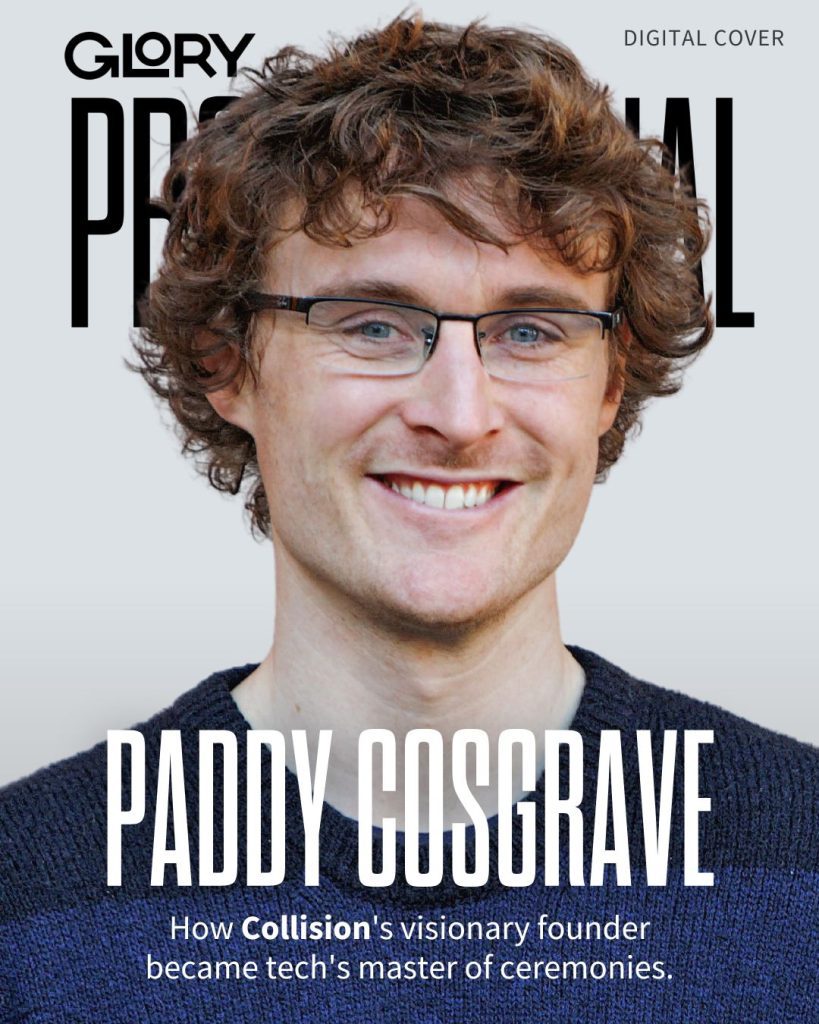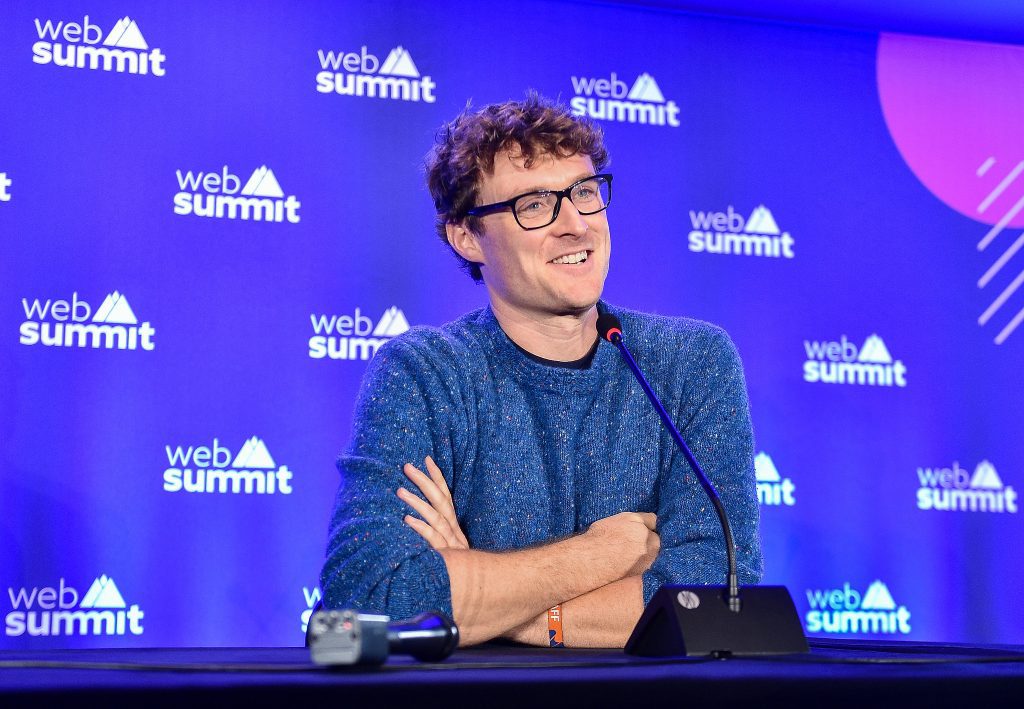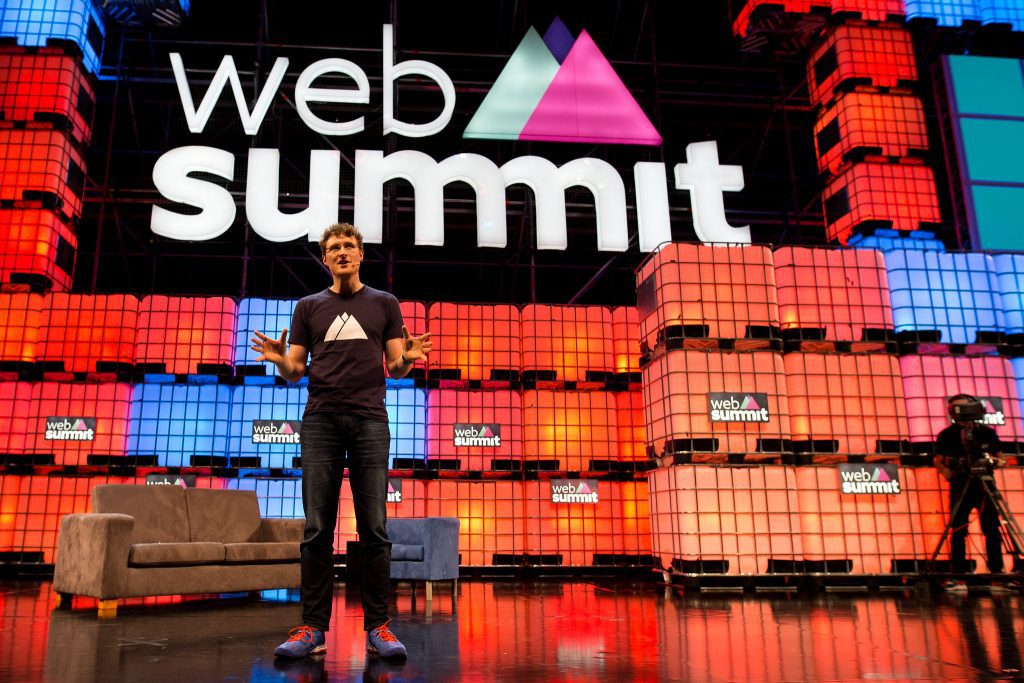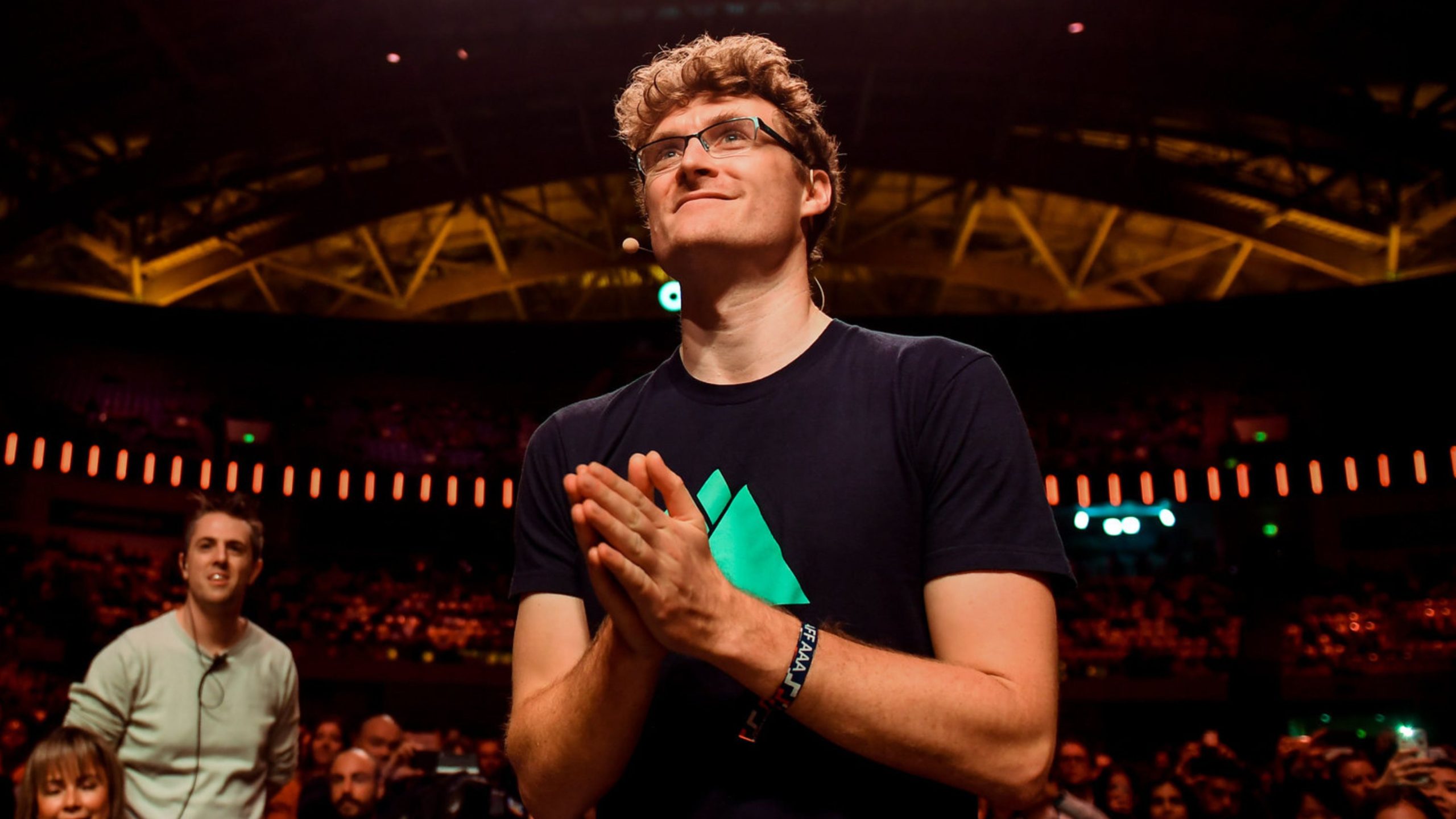Since 2019, Toronto has witnessed an annual migration of tech’s most influential leaders descend upon the city’s Collision conference. Known as the ‘Olympics of Tech,’ Collision is the brainchild of founder Paddy Cosgrave, who has built the annual tech conference into one of the biggest global gatherings of tech founders, entrepreneurs, startups, and world leaders. Moving from its previous home in New Orleans to its current residency in Canada, Collision has welcomed over 70,000 people to Toronto and is forecasted to have a total economic impact of $188 million over the course of its past three events.
While in town for Collision 2023, Cosgrave sat down with Glory Professional to talk about his humble beginnings, how to build an engaged community, and the most important discussion we’re having in tech right now.
Your bio online states that you help ‘engineer serendipity.’ Can you unpack that?
Paddy Cosgrave: People go to our events to meet each other and network, and we work hard to build software and experiences that will increase the likelihood that people will meet with each other effectively and serendipitously. If you take Web Summit, for example, that’s 70,000 people. It’s an extraordinarily large number of people from almost every country in the world. All of them, for the most part, are involved in building extraordinary tech companies and are eager to find investors, great journalists to tell their stories, potential partners, and customers. Our job is to try and help them on that journey.
What do you think is Collision’s unique point of view compared to other tech or business events and platforms around the world?
Paddy Cosgrave: We have a lot of stages and we, ourselves, try not to take a particular view on the world but provide platforms to people with a diversity of views. They could be geopolitical, they could be on technology. You’re going to find a lot of people talking about artificial intelligence or AI, and you’ll find those that are the biggest promoters waxing lyrical about how transformative and wonderful AI is going to be. And then on the other side, you’ll find voices who say, hold on a second. This technology is dangerous. It needs to be regulated, and we must slow down. In a sense, we’re like a parliament where there are lots of people with a diversity of views and viewpoints, and we, as best we can and within reason, provide a platform to those people.
The same applies on matters of geopolitics, which often creeps into our tech conferences. Consume any news media about the rest of the world, and you’ll see that right now within tech, there are disagreements between the United States and China over semiconductors or other technologies. That then bleeds into some of the discussion that you’ll end up finding at our events.
But then our events comprise nearly 20 stages, which represent industries as diverse as fashion, music, and sport. It’s not often the people on those stages are discussing geopolitics and semiconductor independence. They’re discussing their own industries: fashion, sport, music—and that’s collision. Collision just is an amazing gathering of people from so many different industries that you’ll find discussion and speakers on pretty much any topic under the sun.
You’ve got some of the most influential tech and business leaders within arms reach. From your perspective lately, what do you think is the most important discussion that we’re having right now around technology and business today?
Paddy Cosgrave: I think for most of the last 500 years, the West has led the world broadly in terms of innovation, certainly over the last 150 years. That has now changed. The West is a laggard in most areas of high technology and rapidly falling behind in those areas as China shoots ahead. Soon, China will dominate every single materially significant sector of technology. The failure of the West to continue to innovate faster than the rest of the world is becoming an increasing issue. I think the big emerging debate of the coming years is: Is our model in the West good enough? Could it not be better? Are there things we should improve or do we need to rethink how we organize and run our societies entirely? And I think there’ll be a growing percentage of the population in the West who will seek or believe that we probably should abandon many of the models of development or innovation that we have been pursuing in the West because they don’t seem to work as well as in China.
I think China owns the 21st century, and they might increasingly own intellectual discourse in the West with regard to how we are going to live and organize our economies because it’s not working as well as it perhaps should be. Maybe there are things that we can learn from China.


What do you think are the biggest hurdles and opportunities for entrepreneurs today?
Paddy Cosgrave: Rates of entrepreneurship are relatively the same, irrespective of your level of educational attainment. So if you manage not to finish high school, the probability that you will start your own business is no different to someone who gets a PhD. But the larger and ever-growing difference is the type of company scale and sophistication founded by somebody who doesn’t manage to finish high school versus somebody who finishes with a PhD or further postdoctoral research. Someone with a lot of education will tend to, on average, create a much larger, much more economically successful and sophisticated company than somebody that drops out of high school.
I think sometimes we fool ourselves into thinking that more education is a bad thing, and that what everybody should do is just try to create a business. And of course, sometimes people with very limited amounts of education can create amazingly sophisticated and successful businesses, but on average, if you want to build a business, the overwhelming data says you should try and become as educated as possible and spend several decades working for someone else.
RELATED: How SSENSE CEO Rami Atallah Built Today’s Most Influential Tech and Culture Platform
The best age to start a company that’s going to be ultimately successful is in your forties. Of course, it is incredibly appealing to start a company in your twenties. There are so many great Hollywood movies about people dropping out of university and creating a multi-billion dollar company but when you zoom out and look at all of the data, company formations, failures, and successes, you’re far better off spending time working in your particular niche or industry, learn a lot about it, and then think about starting a company.
The discourse around entrepreneurs over the last decade has seemingly gone from being the new rockstars of the world to individuals that should be approached with skepticism. What have you noticed on your end?
Paddy Cosgrave:I think you’re entirely right. I think we live in societies in the West where there are increasing levels of inequality and, very understandably, there are growing levels of frustration and cynicism towards those who accumulate outsized amounts of money in society, often making no contribution back to the society that they have profited from being part of. That is, they are not paying their fair share of taxes as one example.
On top of that, over the last half a decade I think there has been very well documented cases of wrongdoing in entrepreneurship in tech. There have been some great movies and documentaries, which I think contribute to a healthier skepticism around a period of hero worshiping of entrepreneurs. Our societies are held together by more than entrepreneurship. That has been the case, that is the case, and that will always be the case. Venerating or elevating some subset of our society to a higher altar than everyone else is never a good thing. Frankly, there’s been too much idolation of entrepreneurs and I think the reset is quite healthy and warranted.


Previously, you were the executive director of Rock the Vote Ireland back in 2007. So, you clearly have a passion for cultivating community and facilitating dialogue. In your experience, what has been key to building the Collision community?
Paddy Cosgrave: A lot of our customers and speakers are incredibly busy investors. They, for example, don’t live in Toronto. Many of them are on the west coast of the United States. They’re managing hundreds of millions or billions of dollars of other people’s money that they’re supposed to be investing as prudently as possible. They don’t waste their time. So, if you waste their time by inviting them to your conference and they don’t find value in that event, they’ll vote with their feet and they won’t come back. And that extends to the attendee base at large. We’re under pressure to ensure that we provide value for as many very busy, successful people as possible. We can’t succeed all of the time for everybody that comes to Collision or Web Summit, but we have to try our best.
Back in 2019, you brought Collision to Toronto from New Orleans. Now that you’ve had a few events in Toronto, what has been unique about Canada’s tech and entrepreneurial ecosystem in attracting a global audience such as yours?
Paddy Cosgrave: One of the things I’ve noticed about Canada, and I think Canada doesn’t do a good job of telling this story, is that Canada has absolutely world-class universities. Take Waterloo, for example. It’s sort of the secret engineering school of Silicon Valley. Now, it’s unfortunate that Canada is training many engineers and that as soon as they get their sheet of paper or graduate, they’re on a plane, oftentimes to San Francisco or Seattle or elsewhere. What’s heartening is that increasingly those graduates are working for Canadian tech companies. In some cases, they’re starting their own companies. I just think it’s incredible.
Canada obviously has invested in its higher education system for a sustained period of time, and in probably quite significant levels. I’m sure there are debates in the country saying we’re wasting money, that we’re throwing it at our universities and various research laboratories. But from my eyes and from the data I’ve seen, it does appear to be working pretty spectacularly. It’s also a reason why so many international tech companies have opened up offices over the last number of years in Toronto, Ottawa, Calgary, Vancouver, and elsewhere. The base of highly educated talent, in particular engineering talent, is profound. It’s very impressive.


Ultimately, what does impact mean to you through the lens of Collision?
Paddy Cosgrave: We think about it in a number of ways. We have a community team, and for them impact is about engaging with underprivileged and marginalized communities across Canada, involving them in the event. Also increasing the participation of female entrepreneurs as compared to a traditional tech conference, and female executives. I think that team is rightly proud of the work that they do, and the inroads that they’ve made with these communities in Canada, and also including marginalized communities in the United States, Brazil and elsewhere that participate in Collision. For other teams within the organization that I get to work in, what matters to them is the number of top-tier investors that are meeting with great startups over the course of the three days at Web Summit.
You grew up on a farm in Wicklow, Ireland, which is otherwise known as the ‘Garden of Ireland’ because of its natural beauty. How did a young Paddy grow up to build one of the world’s biggest tech platforms?
Paddy Cosgrave: I wanted to be a professional tennis player but I absolutely, categorically wasn’t good enough.I grew up in a house where I was surrounded by computers. My dad was a farmer, but he was completely obsessed with them. All of the earliest computers in their various forms from Apple to the Scion, that was the world I grew up in. I always wanted to do stuff in tech and through a series of lucky chances, I ended up organizing a tech conference, which was really a pub crawl in Dublin back in the day. That was the genesis of Web Summit.
How did you learn to be an entrepreneur? Where did you first foster that spirit of entrepreneurship that has fueled your career trajectory?
Paddy Cosgrave: I think as a kid I was always just doing things. I was buying penny sweets wholesale and bringing them to school and selling them to my friends. I never wanted to work for anyone, I just wanted to do my own thing. I’m not driven by money and I don’t own fancy things but I am very interested in creating things that hopefully are nice and beautiful. Web Summit is one example of that.


What gives you courage?
Paddy Cosgrave: I think with high degrees of privilege, of which I was largely born into, you have more room than most other people to do what might be considered courageous. The downside of failure is essentially reduced radically because you have this invisible social net that oftentimes people don’t think about. I lament the fact that many of the most talented people—young people in our society—are held back from pursuing their creative ambitions because they don’t have the freedom to even try. Instead, out of necessity, they have to seek gainful employment. [My] courage comes from being comfortably middle class, and I don’t think the same can be said about our entire population. It’s something that we don’t reflect on enough as a society, that oftentimes the seemingly brave entrepreneurs actually have the oxygen or the runway to experiment that comes with the privileged backgrounds that they happen to be from. That’s something that haunts me a little bit.
What’s the big picture for you? What’s your mission?
Paddy Cosgrave: If I have any mission in the world, I would just like countries to stop fighting with each other. We’re just a singular species that lives on a singular planet in this vast universe and we really need to figure out how to all get along—less demonization and veneration. All countries do shitty stuff, and if you centralize power, it corrupts people. You need transparency and accountability, and to me, these are important things.
In terms of my values, I think I’m quite drawn to anarchism, which is ultimately non-hierarchicalism. When you talk to the CEOs of the biggest companies on Earth, which are just giant autocracies, they marvel at the ability of small, flat, non-hierarchical teams to innovate. That’s essentially what a startup is, by the way. Wikipedia is effectively non-hierarchical. The internet is kind of non-hierarchical. There isn’t a committee that says this is the most important website, or that is the most important website. So, I’m quite drawn towards the overall philosophy of anarchism. It gets a bad name but it’s about more democratic methods of running a society. I think there’s a degree of truth in that. It’s not all good, but there’s something sort of seductive about anarchism.













